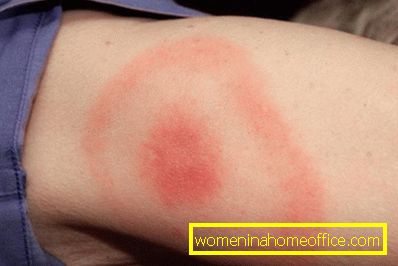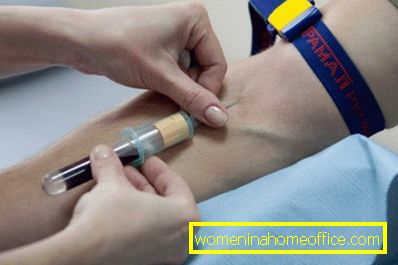Borreliosis
Borreliosis (Lyme disease) is seasonal in nature and mostly coincides with the activity of ticks. But not all parasites are carriers of this disease, but only those that fed on the blood of infected animals. The tick can be not only a carrier of Borrelia, but also tick-borne encephalitis virus, etc.
What is borreliosis?
Borreliosis, a disease caused by spirochetes of the Borrelia genus, is characterized by skin lesions and erythema. After weeks or months, damage to the nervous system, joints, and heart may occur.

Signs of borreliosis
- Tick bite redness
- Malaise (fever, headache), pain in the joints
- Nervous System Disorder
How is borreliosis transmitted?
The disease can not be transmitted by airborne droplets, by household, during sexual intercourse. For those around the patient is not dangerous borreliosis. The carriers of this disease are usually infected ticks, although sometimes there may be other blood-sucking insects.
After 3-30 days after receiving a bite, the infected parasite exhibits symptoms of borreliosis. The first thing that appears at the site of the bite is reddening of the skin, which expands and eventually the center of the spot turns pale, acquires a bluish tinge in the form of a ring. If the bite is not treated, the stain persists for 2-3 weeks, then disappears. After 1.5 months signs of impairment in the nervous system, joints and heart begin to develop.
Analysis for Borreliosis
A blood test is performed to diagnose the disease. Tests for Lyme disease should be taken, first of all, to clarify the suspected diagnosis.

From the beginning, the patient is taken blood from a vein, collect it in a sterile empty tube. Sometimes it uses special tubes with gel. A cotton swab is placed in the place from which blood was taken to prevent bleeding. If after such a blood sampling a bruise arises in a person, experts advise applying compresses to it, which have a warming effect.
If you are not infected with borreliosis, the result of the analysis will be negative. But it must be borne in mind that sometimes experts get inaccurate test results. In such cases, you may be assigned a second blood sample. A false positive result is possible if any other bacteria are present in the blood.
The effects of borreliosis usually occur if the disease is started. She goes into stages 2 and 3. In such cases, chronic disorders of the nervous and cardiovascular systems occur. Stage 3 is characterized by inflammation of the joints (the so-called Lyme arthritis). In the absence of proper treatment, borreliosis can lead to death or severe disability.
Prevention and treatment of borreliosis
To prevent Lyme disease, you must follow some simple rules.
- For hiking in the forest, be sure to wear closed clothing - shirts with buttoning long sleeves, boots, elongated pants, thick gloves, hats.
- Apply insect repellent to your skin and clothing.
- If a tick hits the skin, it must be carefully removed with tweezers.
- Mites correctly remove twisting movements behind the head.
- In no case squeeze, do not drag the parasite vertically.
- After removing the insect, wash the wound and wash your hands with soap and water.

If you are bitten by a tick, remove it, put it in a closed container and take it to a laboratory for analysis. Be sure to consult a doctor!
Having established the diagnosis of borreliosis, the doctor will prescribe antibiotics. At stage 1 of the disease, the treatment is carried out on an outpatient basis, at 2 or 3 - in the hospital. This makes it possible to avoid disruption of the functions of the central nervous system and joints.
Treatment should be carried out in an infectious diseases hospital, where, first of all, therapy is recommended to destroy borrelia. Without this treatment, the disease can progress, become chronic.
Knowing the symptoms and the course of the disease, you will be able to assess how dangerous tick-borne borreliosis is. This is a serious disease that can occur in various forms, causing severe damage to the nervous and cardiovascular systems. Clinically diagnosed borreliosis responds well to antibiotic therapy, so if you have any suspicions, consult a doctor. A significant role in the fight against borreliosis is the prevention of parasite bites.
Even if you had Lyme disease, do not be disheartened. Steadily follow the recommendations of doctors, adhere to a healthy lifestyle, and full recovery will come very quickly.